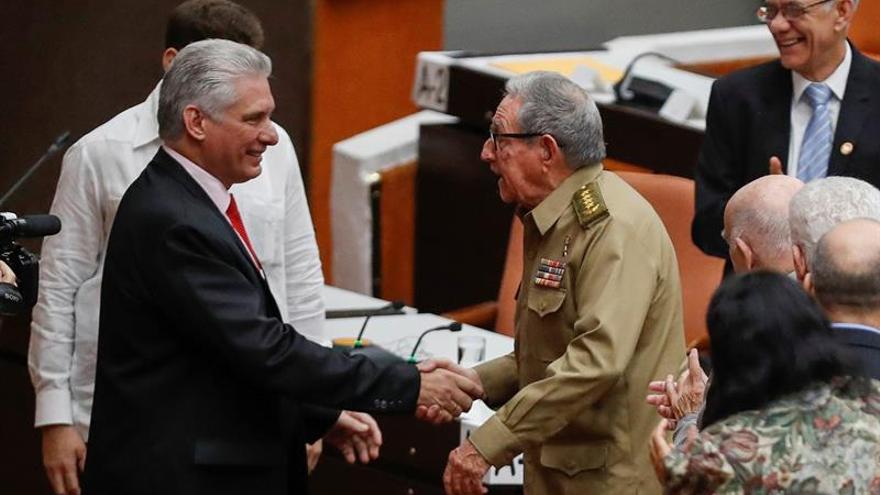
![]() 14ymedio, Reinaldo Escobar, Havana, 22 December 2019 — Along with the appointment of Manuel Marrero Cruz as prime minister, the deputy prime ministers were also appointed this Saturday and the holders of six government portfolios were renewed. In total, 19 ministers were ratified in their posts, including the most important, such as the Interior and Armed Forces.
14ymedio, Reinaldo Escobar, Havana, 22 December 2019 — Along with the appointment of Manuel Marrero Cruz as prime minister, the deputy prime ministers were also appointed this Saturday and the holders of six government portfolios were renewed. In total, 19 ministers were ratified in their posts, including the most important, such as the Interior and Armed Forces.
The deputy prime ministers served until yesterday as vice presidents of the Council of Ministers, with the exceptions of José Luis Tapia Fonseca and Alejandro Gil Fernández, current Minister of Economy and Planning. The presence of Ramiro Valdés among the six deputy prime ministers is a sign of the control that the historical generation still maintains.
This Council of Ministers will be responsible for making the decisions that derive from the end of the dual monetary system, a measure that is often announced as imminent but now seems to be postponed and that to a great extent will affect the functioning of the accounting of the State entities.
Another aspect that will characterize the current term of office will be the application of the new Constitution and its complementary laws. The new Government will be responsible for introducing changes aimed at reformism or maintaining immobility. Although there is a broad consensus on the belief that ministers have been placed in their posts only to obey, it cannot be denied that they will always have a margin to propose and to approve or disapprove proposals that come from above.
The great weakness of verticalism lies precisely in its proven allergy to the most minimal fissure. Any attempt to govern in a collegial way opens the opportunity for new ideas to appear on the table. It all depends on open to risk those are who remain sitting around the table, and that is why it is important to know who they are.
The Council of Ministers was finally formed in this way:
Vice Prime Ministers of the Republic of Cuba:
Ramiro Valdés Menéndez
Roberto Morales Ojeda
Inés María Chapman Waugh
José Luis Tapia Fonseca
Alejandro Gil Fernandez
Ricardo Cabrisas Ruiz
Other members of the Council of Ministers:
Brigadier General José Amado Ricardo Guerra (Secretary)
Army Corps General Leopoldo Cintra Frías, Minister of the Revolutionary Armed Forces (FAR)
Vice Admiral Julio César Gandarilla Bermejo, Minister of the Interior.
José Ramón Saborido Loidi, Minister of Higher Education.
Ena Elsa Velázquez Cobiella, Minister of Education
Meisi Bolaños Weiss, Minister of Finance and Prices
René Mesa Villafaña, Minister of Construction
Rodrigo Malmierca Díaz, Minister of Foreign Trade and Foreign Investment
Bruno Rodríguez Parrilla, Minister of Foreign Affairs
Eduardo Rodríguez Dávila, Minister of Transportation
Elba Rosa Pérez Montoya, Minister of Science, Technology and Environment
Oscar Manuel Silvera Martínez, Minister of Justice
Betsy Díaz Velázquez, Minister of Internal Trade
Alpidio Alonso Grau, Minister of Culture
Jorge Luis Perdomo Di-Lella, Minister of Communications
José Ángel Portal Miranda, Minister of Public Health
Alejandro Miguel Gil Fernández, Minister of Economy and Planning
Gustavo Rodríguez Rollero, Minister of Agriculture
Antonio Rodríguez Rodríguez, president of the National Institute of Hydraulic Resources
Alfonso Noya Martínez, president of the Cuban Radio and Television Institute
Osvaldo Vento Montiller, president of the National Institute of Sports, Physical Education and Recreation
New government ministers:
Marta Elena Feitó Cabrera, Minister of Labor and Social Security (until now Deputy Prime Minister)
Juan Carlos García Granda, Minister of Tourism (until now first Deputy Minister)
Marta Sabina Wilson González, Minister-President of the Central Bank of Cuba (until now President of the Foreign Bank of Cuba)
Manuel Santiago Sobrino Martínez, Minister of the Food Industry (until now president of the provincial government of Granma)
Eloy Álvarez Martínez, Minister of Industries (until now first Deputy Minister)
Liván Arronte Cruz, Minister of Energy and Mines (until now Vice Minister)
Several ministers were “released from their positions,” an expression the Government generally uses to refer to a dismissal. Those released are: Margarita Marlene González Fernández (Labor and Social Security); Iris Quiñones Rojas (Food Industry); Alfredo López Valdés (Industries); Raúl García Barreiro (Energy and Mines) and Irma Margarita Martínez, of the National Bank of Cuba.
_______________________
COLLABORATE WITH OUR WORK: The 14ymedio team is committed to practicing serious journalism that reflects Cuba’s reality in all its depth. Thank you for joining us on this long journey. We invite you to continue supporting us by becoming a member of 14ymedio now. Together we can continue transforming journalism in Cuba.
